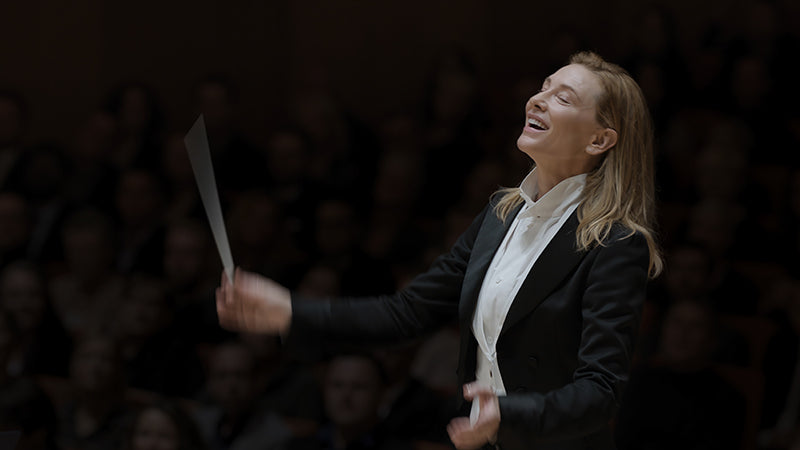In case you missed it, Cate Blanchett takes an Academy Award-nominated star turn in the movie Tár. She plays Lydia Tár, the first American and the first female conductor of the Berlin Philharmonic.
Within the first 30 minutes, she delivers a tour-de-force lecture/takedown of an unhappy student at Juilliard. This performance alone is Oscar-worthy.
As far as the movie and her character’s monomaniacal, narcissistic and sexually abusive behavior is concerned, this movie has pretension written all over it.
Oh so high-minded, Tár is the classical music world’s version, in my mind, of the heavy metal spoof This Is Spinal Tap without the self-inflicted irony of the latter.
Sometimes a confluence of circumstances can make one scratch their head and wonder about the nature of coincidences.
Such was the case during my recent viewing of an invitation-only screening of the movie Tár at a custom-built Dolby theater in New York City at a SAG-AFTRA (Screen Actors Guild-American Federation of Television and Radio Artists) event only two weeks after my very first classical music concert experience at Carnegie Hall.
I watched (and most importantly listened) to the Berlin Philharmonic performing Mahler’s Symphony No. 7. As this was my first classical music experience, I likened it to having someone see the Rolling Stones at Madison Square Garden in 1969 as their first-ever rock concert.
You are starting at the top!
I walked out of Carnegie Hall in awe and had hundreds of questions swirling around in my head about every aspect of what I just saw. How exactly does a 125-piece orchestra work? How did Mahler compose for all the instruments? Are all the musicians flown in from Germany or do they use locals? Are the percussionists reading e-mails while they wait for the exact second that they stand up and hit a triangle? What happens if you mess that up? Why was there an acoustic guitar part?
How much better are the concertmaster musicians than all the others?
Tár is a fictional story (suspense/thriller) about the first female conductor of the Berlin Philharmonic as she is conducting (among many other plot lines) a recording session of Mahler’s Symphony No. 5.
The movie also peels back the curtain on the inner workings of the business of the classical music industry.
No, it is not a comedy like the fake rock doc movie This Is Spinal Tap, but they both share the audience’s voyeuristic desire to see the dark side of an industry, although in one case we watch an artist fall from grace and the other shows an artist climbing back from the very bottom.
I’m not exposing which is which, however.
There are huge exaggerations of the character flaws of the main characters in both movies that are equally outrageous, regardless of the directors’ intentions. As I noted, Cate Blanchett may win an Academy Award for the monologue in the beginning of the picture. Her depiction, however, of her conductor’s technique (in the movie she is obsessed by Leonard Bernstein) does not ring true to me.
I asked myself, “Is this because, as a woman, she looks like a man conducting?” Fair question, I think. Is it that, as a professional musician, when I watch an actor portray a musician, I’m always looking for the fake edited cutaway? Possibly.
I read stories about Blanchett’s training for the movie. Her character, Lydia Tár, is also a self-styled creation (her real name is Linda Tarr from Staten Island, and that alone should tell you about who and what she is) is obsessed with Leonard Bernstein and watches videos of his conducting constantly. She becomes a world-renowned conductor and winner of the rare EGOT (Emmy, Grammy, Oscar, Tony) combination. Blanchett’s performance is fierce and it’s impossible to take your eyes off her as she manipulates and connives her way through the maze of political and sexual intrigue that lurks behind the curtain of the professional classical music scene.

Sophie Kauer as Olga Metkina and Cate Blanchett as Lydia Tár. Courtesy of Focus Features.
I recently watched a Zoom interview hosted by Bradley Cooper with Blanchett, her co-star, Nina Hoss, and the director of Tár, Todd Field. Blanchett tells the story of the actual shooting day with the Berlin Philharmonic. She said that the musicians came off, at first, like they had contempt for her as an actor trying to be a believable conductor. By the end of the day, as Blanchett demanded respect and actually conducted them, the entire film crew and orchestra had developed a huge mutual respect for each other’s talents.
That’s good to hear, I guess, but that didn’t stop me from feeling the way I did watching the movie.
The Tár character also suffers from intense ADHD, which creates hallucinations in her head that allows the director to take you down suspense-filled blind alleys.
It’s a long movie and at the point where I just about gave up as to where it was all going, the end came.
Of course, I will not tell you what happens, but I will say that the final scene has become one of confusion, conjecture and interpretation, should you wish to wade into that controversy.
It truly was amazing to see my first classical music concert just a few weeks before seeing Tár. It gave me much more of an appreciation for the movie than I would have, had I not had that experience.
Like I said in the beginning, Cate Blanchett may win another Oscar.
So…is it Spinal Tap/Tár?
Watch them both together and maybe you will get my sense of humor.
Go forth, unafraid…
Header image: Cate Blanchett as Lydia Tár. Courtesy of Focus Features.


